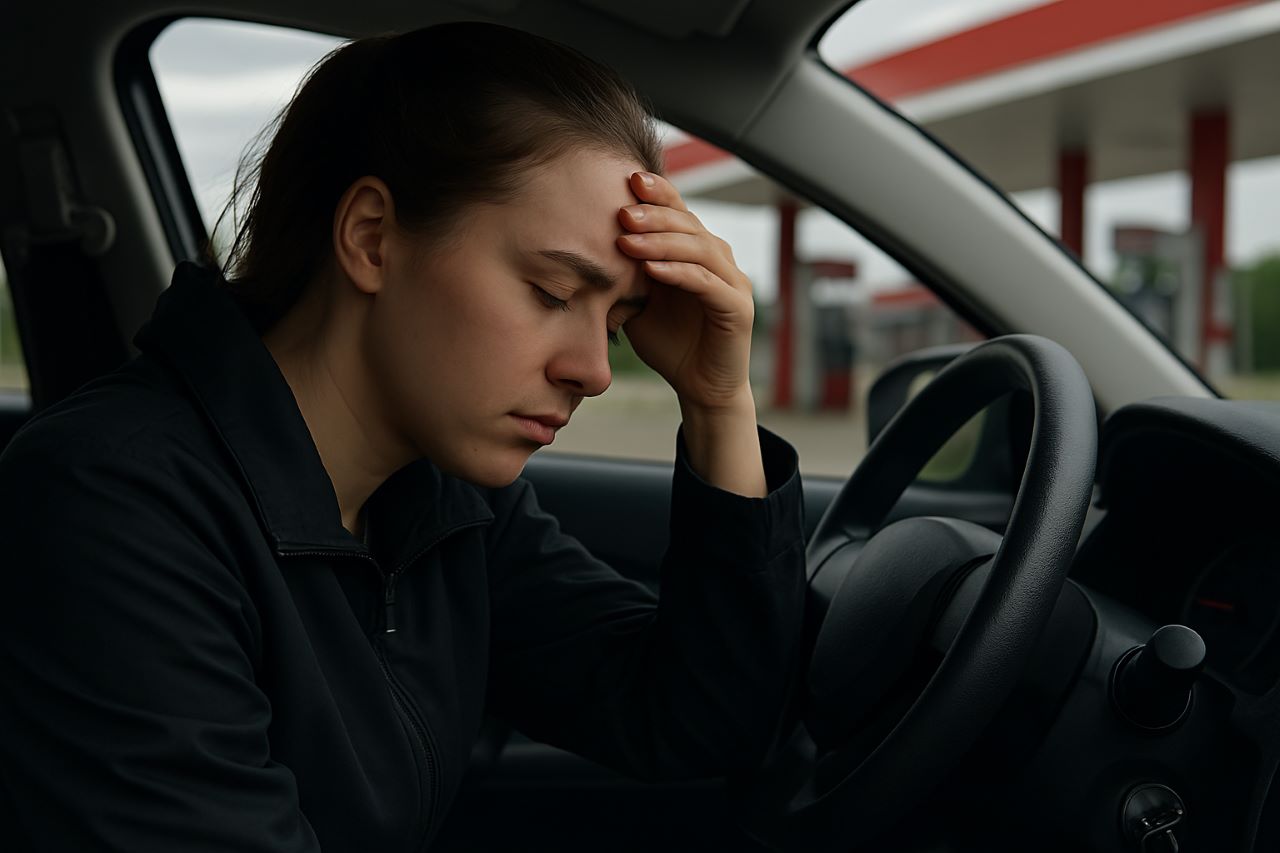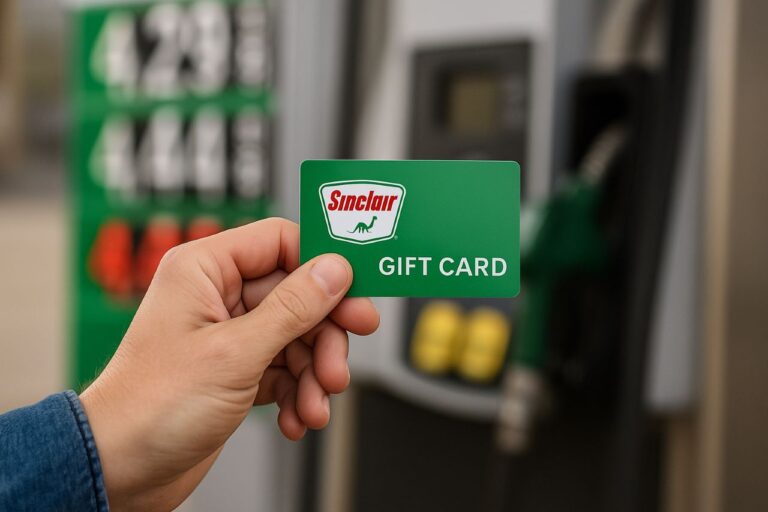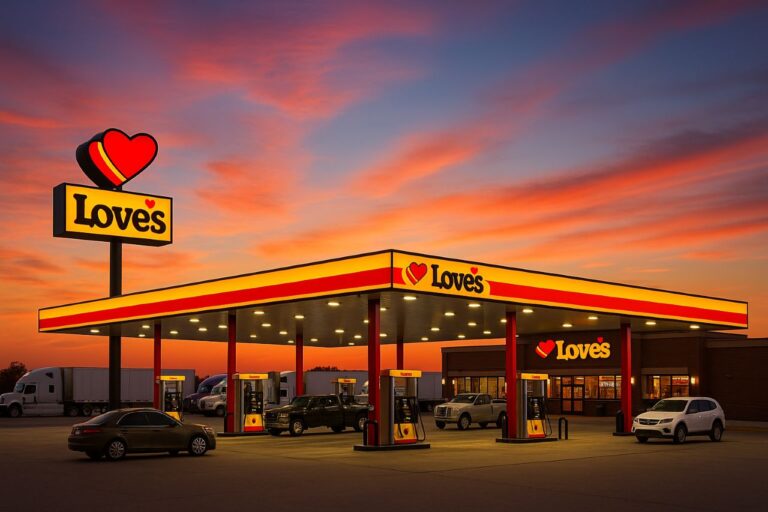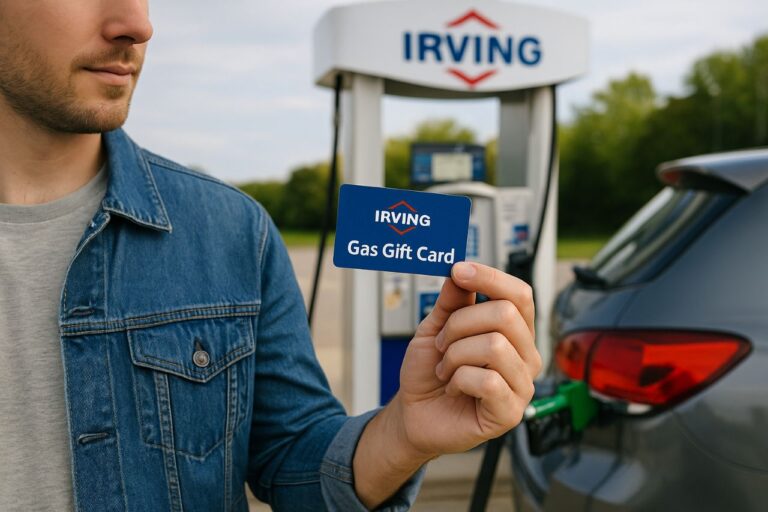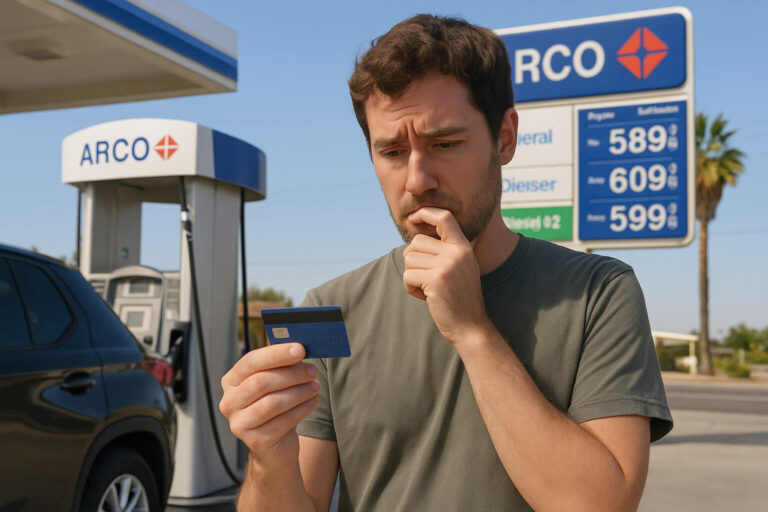Gas Card Help from Churches: Emergency Assistance
When fuel costs spike or lifestyles takes an unforeseen twist, even a short trip can feel like impossible. Many people find themselves stuck, unable to get to work, school, or important appointments. In moments like these, a small gesture of help can make world of difference.
That’s why a few church buildings across the USA are stepping up to offer emergency gas card assistance. Whether you’re dealing with a crisis or simply need a one-time boost, religion- based assist might be closer than you think. This article will guide you on where to look and how to get help.
Table of Contents
Emergency Gas Help Is Closer Than You Think
From national organizations to local congregations, churches are presenting gas cards to the ones in urgent need. These programs are often part of broader missions to serve their communities with love, compassion, dignity. If you’re searching for instant assist, understanding where to get help from can make all the difference.
Why Do Churches Help with Gas Cards
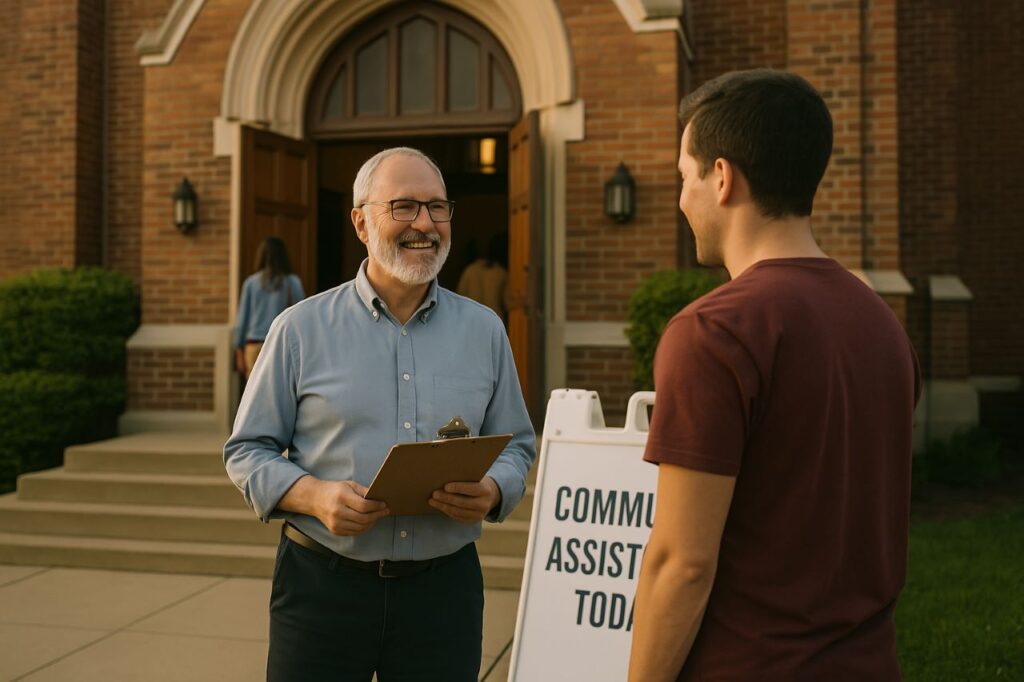
Faith in Action: Serving the Community
Churches aren’t just places of worship—they’re hubs of hope, compassion, and community help. Many consider it’s their responsibility to assist those in need, inspired through teachings of generosity and kindness. Helping with gas cards is one way they turn faith into action by using meeting real, essential needs.
When someone can’t afford the money for fuel, it can create challenges for them from reaching job interview, medical appointment, or even picking up their kids from school etc. Churches realizes how critical transportation is, and that’s why many provide assist—no strings attached—just to get someone moving again.
Where the Help Comes From
The gas card support churches provide is normally funded via donations, community outreach applications, or partnerships with other local nonprofits. Large church organizations regularly devote budget or ministries focused on crisis help, while smaller churches may also assist on a case-by-case basis.
Even if churches can’t provide direct assist, they frequently keep a community of contacts—different churches, local charities, or civic groups—that might be capable of step in. So, although the first solution is “we can’t” the next one might be “but we understand someone who can.”
Churches That Help with Gas Cards: 7 Places to Try First
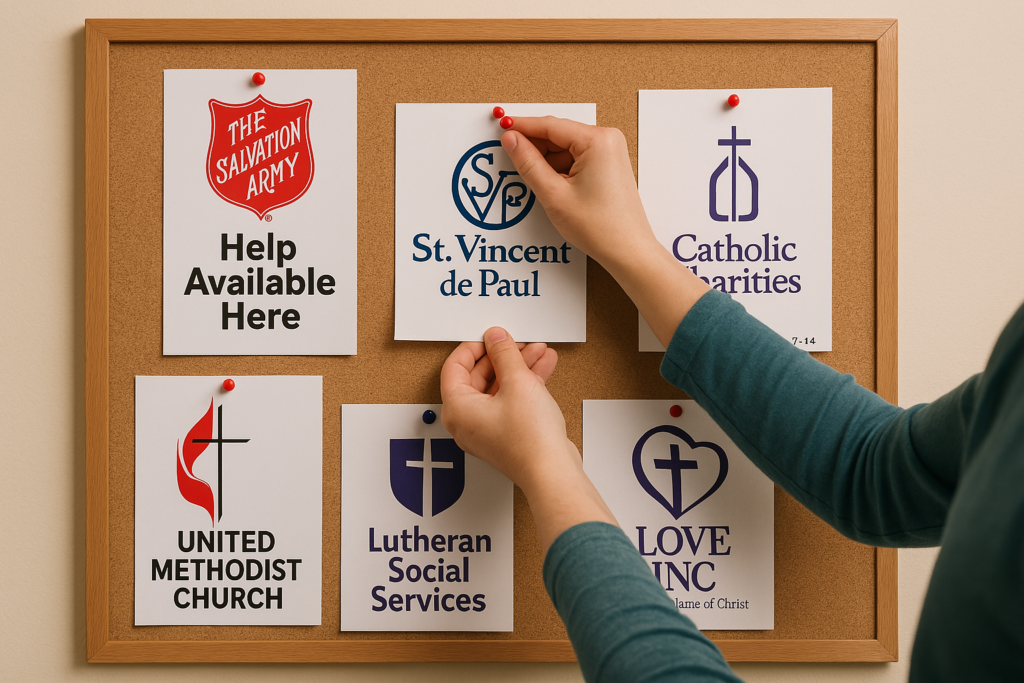
1. Salvation Army
The Salvation army is a trusted call when it comes to emergency help, and lots of their local branches offer gas vouchers or transportation useful resources. Their programs frequently aid individuals who are driving to job interviews, clinical appointments, or shelter services. At the same time as availability depends on funding, they usually prioritize urgent needs and low-income people.
Tip
call your neighborhood Salvation navy and ask in particular for “emergency help” or “transportation help.”
2. St. Vincent de Paul Society
This Catholic charity operates through local parish groups (referred to as conferences), and it’s well-known for helping with rent, utilities, food—and yes, gas cards. Volunteers regularly visit houses or meet with individuals to assess needs. The assistance is private, religion-based, and based totally on community giving.
Tip
Use their nationwide website to find the conference nearest you and ask if they help with gas cards for your area.
3. Catholic Charities
Catholic Charities serves millions of people every year, and transportation help—which includes gasoline cards—is available in a lot of their regional programs. They frequently assist people trying to get to work, attend job training, or address surprising emergencies
Tip
Check the website in your local Catholic Charities workplace and look for “emergency financial help” or request to talk to a caseworker directly.
4. United Methodist Church
Many United Methodist churches provide small gas cards as a part of their outreach ministries. These can be dealt through meals pantries, closing closets, or benevolence funds. Assistance often relies upon on the church’s size and available donations, but many will at least offer referrals in the event that they can’t assist without delay.
Tip
Go to the church office in person or call throughout the week. Ask for their “mission” or “community assistance” coordinator.
5. Lutheran Social Services (LSS):
LSS has a huge community of support programs across the U.S. Whilst services vary by region, gasoline assistance is every so often presented to assist people get to vital appointments or get away unstable housing situations. They commonly guide the aged, homeless, and coffee-earnings households.
Tip
Go to the Lutheran Social services website and discover your state or region to look current packages and application steps.
6. Love INC (Love in the Name of Christ)
Love INC works as a bridge among churches and people in need. When you call, they investigate your scenario and refer you to partner churches that offer the right type of assist—inclusive of fuel playing cards, rides, or bus passes. Their model is collaborative and community focused.
Tip
Find a Love INC affiliate office in your area and undergo their intake process. They’ll connect you with churches offering transportation aid.
7. Local Independent Churches
Don’t underestimate the smaller, independent churches for your area. Many provide gas cards quietly and informally through benevolence budget. These are handled on a case-by-case basis, especially in case you provide an explanation for your situation sincerely.
Tip
Look for “non-denominational churches near me,” go to their websites or call, and ask if they have outreach packages or emergency budget.
Who Can Get Help with Gas Cards from Churches?
It’s Not Just for Members
A common false impression is that you have to be a church member to receive help. But, many churches function at the ideas of community provider and inclusivity. Their project extends past their own congregation, aiming to help absolutely everyone in need—regardless of their faith, ethnicity, or social history. By using imparting gas playing cards, those church buildings attempt to cope with immediately transportation challenges that could in any other case disrupt daily lifestyles, like getting to paintings, attending school, or making clinical appointments. This spirit of giving ensures that guide reaches the wider community, fostering goodwill and unity.
Typical Eligibility Requirements:
Eligibility requirements for church-based gas card assistance programs can vary by organization and location. However, common criteria often include:
1. Proof of Financial Hardship
Applicants are commonly required to explain their financial needs or misery. This is often regularly performed by providing files such as recent pay stubs, unemployment benefits statements, tax returns, or records of government help like food stamps or Medicaid. These files are the evidence of that the applicant is facing real financial money problems, ensuring that the assistance reaches people or households who’re actually suffering.
2. Valid Identification
Most programs require a form of government-issued identification, which include a driver’s license, state identification, or passport. This serves two functions: verifying the applicant’s identity and confirming they reside within the area this system serves. In a few cases, churches can also use this information to prevent abuse of this system or duplication of benefits.
3. Vehicle Ownership and Insurance
Applicants may be asked to provide documentation including car registration and proof of insurance. This ensures that the help is going directly toward a vehicle that applicant owns and drives. Moreover, confirming that the vehicle is legally insured helps uphold this system’s ethical guidelines and avoids liability issues for the church or organization.
4. Purpose of Assistance
Many programs require candidates to specify why they are requesting for gas card assistance. Generally general motives include commuting to a job interview, maintaining employment, driving for medical appointments, or handling emergency situations such as family crisis. Churches always prioritize assistance based on the urgency and importance of the applicant’s need, making sure that the aid supplied has a meaningful impact.
5. Residency Requirements
Applicants can also need to prove where they are living in the church’s service area. This can will be completed by presenting a utility bill, lease agreement, or different documents showing their current address. Residency requirements help churches focus their efforts on assisting their nearby community and make sure that limited resources are distributed fairly among local citizens.
Additional Considerations
While these are common eligibility criteria, it’s critical to be aware that every church or organization may also have its unique requirements and techniques. Some programs may also consider additional factors including family size, the severity of the financial situation, or other kinds of help already being obtained. Churches often inspire candidates to reach out directly for specified information and guidance.
What If You Don’t Meet the Requirements?
In case you don’t meet all the eligibility standards, don’t lose hope. Many churches take into account that life problems don’t always fit neatly into categories, and they often approach every case with compassion and flexibility. Here’s how they could still help:
Additional resources or referrals
Churches often collaborate with local charities, social services, and other religion-based corporations. If they cannot assist immediately, they may help you contact to other programs or corporations higher applicable for your circumstances.
Case-by-case consideration
Explaining your situations honestly can go a long way. Church team of workers are very empathetic and can make exceptions for unique or urgent conditions.
Temporary solutions
Even if complete assistance isn’t possible, a few churches might offer small amounts of gasoline, bus passes, or temporary transportation help to ease your immediate burden.
Compassion and understanding form the foundation of these programs help individuals and families in need. By approaching churches respectfully and openly, you’re more likely to find a pathway to the support you need.
How to Apply for a Gas Card at a Church
Step 1: Locate a Church That Offers Assistance
Start by searching online for churches on your area that provide gas card assistance packages. Use terms like “churches that help with fuel cards close to me” to narrow your search. Websites such as NeedHelpPayingBills.Com or ChurchesThatHelp.Com might also offer directories or beneficial resources. Additionally, local shelters, community centers, or food banks can often offer referrals to churches or groups providing this sort of aid.
Step 2: Contact the Church Directly
When you’ve identified a church which can provide gas card help, reach out during their office hours. Call ahead or visit in individual to give an explanation for your situation with courtesy and inquire about their application. Be prepared to ask if they require an appointment or in the event that they allow walk-ins on specific days. Many churches have structured schedules for distributing useful resource, so knowing their process can prevent effort and time.
Step 3: Bring Required Documents
When you go to the church, make sure you carry all essential paperwork to avoid delays. Typically requested files include:
- A valid ID card to verify your identification.
- Proof of earnings or financial complication, consisting of pay stubs, unemployment documentation, or a letter explaining your situation.
- Evidence of residency, like an utility bill or rent, to show you stay inside their service area.
- Vehicle registration and insurance, if applicable, to make sure you own and insure the vehicle in query.
- A brief clarification of your need, including job-related travel, clinical appointments, or emergencies. Preparing these in advance ensures a smoother application process.
Step 4: Follow Up and Be Grateful
After submitting your application, follow the church’s timeline and procedure. If assistance is unavailable, don’t hesitate to ask for referrals to different applications or organizations that might assist. Churches frequently collaborate with local charities, social offerings, or nonprofit organizations. Showing patience and expressing gratitude, no matter the final results, can leave a good impression and can even open doorways to more resources.
How to Find Churches That Help with Gas Cards Near You
1. Use Online Search Tools and Maps
The net is your high-quality buddy when you’re looking for urgent help. Begin by way of searching terms like “churches that supply gas cards close to me,” “emergency fuel help from churches,” or “faith-based transportation help in [your city or ZIP code].” these searches frequently lead to nearby outcomes with church websites, contact info, and latest updates.
You can also use Google Maps to search for churches to your area. When you find some, visit their websites or social media pages to search for announcements about community help or outreach events. Many churches don’t do marketing about their gas card programs that much, but mention words like “benevolence fund,” “outreach ministry,” or “emergency useful resource,” that are strong signs that they provide help.
2. Check Community Resource Directories and Hotlines
Local nonprofit and authorities’ companies frequently keep updated directories of churches and companies providing economic or transportation assist. Begin with your town or county’s internet site—specially their department of Human Services, Community Outreach, or Emergency Services sections.
You can also use national directories like:
- 211.Org: A 24/7 helpline and online tool that connects people to local support programs, consisting of those run through churches.
- NeedHelpPayingBills.Com: Gives listings of churches and nonprofits that assist with gas cards, utility payments, rent, and more.
- ChurchesThatHelp.Com: Focused in particular on church-based help, this web site lists churches with the aid of location and service type.
These platforms are mainly useful in case you’re in a new place or unsure wherein to start.
3. Ask Local Community Centers or Shelters
Churches often works backstage with shelters, food banks, and community centers. In case you’re already in contact with a local nonprofit, ask if they have information of any churches that provide gas cards or transportation useful resource. Commonly, those corporations refer clients to faith-based organizations that don’t publicly list their services.
Shelter staff, caseworkers, or maybe volunteers can also have private relationships with local churches and might put you in touch immediately with a person who can help.
4. Visit or Call Churches Directly
In case you’re comfortable doing so, reach out to local churches yourself. Call during business hours and in a politely ask in the event that they offer gas card help or if someone from their outreach or benevolence ministry can talk with you. Even if they don’t have a formal program, they’ll provide one-time assist or refer you to a sister church that does.
It may take a few calls, however, don’t get discouraged—many churches are willing to help, specifically while someone reaches out respectfully and explains their want in reality. Staying persist will pay off.
Tips to Increase Your Chances of Getting Help
- Be sincere and specific about why you want gas (e.g., job interview, clinical visit).
- Put together basic documents like ID, proof of address, and vehicle information.
- Stay polite and respectful when speaking with church workers or volunteers.
- Follow up if needed but give them time to reply—don’t overwhelm them.
- Ask for referrals if cannot assist immediately—churches frequently know others who can.
- Be flexible with timing, as a few churches only assist on sure days.
- Express gratitude even though assist isn’t available—it leaves a good impression.
Conclusion: Don’t Lose Hope—Fuel Help Is Out There

Running out of fuel during a crisis can feel overwhelming, but help is nearer than you think. Many churches across the country are there to help with gas cards and emergency transportation aid, particularly for those going through actual hassle.
Whether you’re handling job loss, a clinical emergency, or any other surprising state of affairs, don’t hesitate to reach out. From countrywide charities to small community churches, someone is likely willing to listen—and to help you get back on the road.
You May Want to Read
- Fast Stop Gas Card: Save More with Fuel Rewards
- Card Readers on Gas Pumps Explained: Protect Your Data Today
- Gas Cards for Cancer Patients: Unlock Free Fuel Support & Reduce Expenses
- Affordable Gas Cards for Low Income Families
- Can I Use a Gift Card at a Gas Pump? Truth You Need to Know
Frequently Asked Questions (FAQs)
Do all churches offer gas card assistance?
No, not all churches provide gas cards. However, many do, especially those with outreach or benevolence programs. It’s best to call ahead and ask.
Is gas card help limited to church members?
In most cases, no. Many churches assist anyone in need, regardless of religion or membership status.
What documents should I bring when requesting help?
Typically, you may need a valid ID, proof of address, a reason for the request, and sometimes proof of financial hardship or vehicle registration.
Can I receive gas card help more than once?
Some churches offer one-time help, while others may assist multiple times based on your situation and their available resources.
How quickly can I receive a gas card?
Assistance timelines vary. Some churches offer same-day help; others may take a few days to review your request or schedule an appointment.

